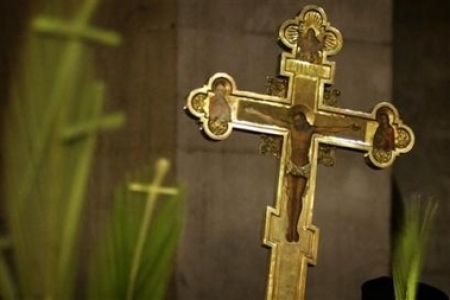Yoga has no place in Christians' lives, Greek Orthodox Church says

Patriarch and senior bishops of the Greek Orthodox Church have declared yoga to be "completely incompatible" with the Christian faith, saying it has more to do with the Hindu religion than physical exercise.
Yoga has no place "in the life of Christians," the church's synod, or governing body, ruled in response to Greek media outlets recommending yoga to deal with stress during coronavirus quarantine, the BBC reports.
"[Yoga] is a fundamental chapter in Hindu religion ... it is not a 'kind of physical exercise,'" the Holy Synod declared in a statement this week.
The church's declaration is based on the "experience of those who practiced yoga," Father Michael Konstantinidis told Greek media. "If yoga offered what man wanted, we would be happy," he said.
Yoga is practiced mostly as a physical exercise by roughly 300 million people around the world, according to the International Yoga Federation.
At an event last year, Metropolitan Nektarios of Argolis warned people about the "dangers" of doing yoga, saying, "We make a confession to God. This is the same thing that people do during yoga," The U.K. Times noted.
Yoga involves "Pranayama," or breathing exercises involve, in some forms of it, the chanting of "Om," a mystical Sanskrit sound that is considered sacred in Hinduism. However, some believe that the religious part of the original yoga can be adopted or customized by people of other faiths as per their own beliefs.
Some practice what they call "Christian yoga." However, Southern Baptist Theological Seminary President Albert Mohler Jr. has denounced the idea, explaining that the origins of the practice are incompatible with Christianity.
In a recent episode of his podcast "The Briefing," Mohler described the origins of yoga, which hail from Hindu and Buddhist practices and philosophy.
"It is deeply based in both Hinduism and Buddhism and the traditional meditative practices that are inseparable from yoga as physical movement involve those traditional Buddhist and Hindu teachings, and it shows up not only in the word 'Namaste,' it shows up even in the basic philosophy of what the body is doing," Mohler said.
"It also shows up in a distinct theological understanding of the body in motion and the body in pose. It also shows up in a deep conflict between Christianity and both Hinduism and Buddhism and yoga as a dimension of both when it comes to the purpose of the mind and how we are as Christians to exercise the mind," Mohler added.
His comments came in response to a proposed bill in the Alabama Legislature that would lift a ban on the practice of yoga in public schools, albeit without the overt religious content. Known as House Bill 235 and introduced in February by state Rep. Jeremy Gray of Opelika, the proposal was approved by the House education policy committee. The bill would allow local school boards to approve yoga classes under certain conditions, among them making the class an elective rather than a requirement.
In 2018, Pastor John Lindell of the James River Church in Ozark, Missouri, warned his 10,000-member congregation not to participate in yoga, saying that positions associated with exercise and meditation activity were designed to "open you up to demonic power."
Lindell gave a sermon, titled "Pursuing the Paranormal," before Halloween that year in which he spoke out against "demonic influences" such as paganism, witchery, sorcery, fortune-telling, astrology and elements of Eastern mysticism such as yoga. "I am doing this because it seems that our culture is becoming increasingly obsessed with all things paranormal," the Assemblies of God pastor said at the beginning of the sermon.
Lindell said that one of the most pressing signs of the "post-Christian" society was the mainstream acceptance of yoga by not only the culture but Christians and Christian organizations.





















